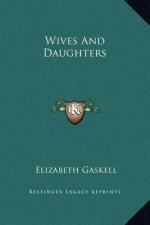‘I don’t see the difference,’ said the vicar, a little querulously; ’but I dare say there is a difference, and I have no doubt what you say is quite true. I should not make talk, but talk; and as both are equally difficult to me, you must let me purchase the privilege of silence by this ten-pound note.’
’Thank you. It is not so satisfactory to me; and, I should think, not to yourself. But probably the Joneses and Greens will prefer it.’
Mr. Ashton would look with plaintive inquiry into Mr. Gibson’s face after some such speech, as if asking if a sarcasm was intended. On the whole they went on in the most amicable way; only beyond the gregarious feeling common to most men, they had very little actual pleasure in each other’s society. Perhaps the man of all others to whom Mr. Gibson took the most kindly—at least, until Lord Hollingford came into the neighbourhood—was a certain Squire Hamley. He and his ancestors had been called squire as long back as local tradition extended. But there was many a greater landowner in the county, for Squire Hamley’s estate was not more than eight hundred acres or so. But his family had been in possession of it long before the Earls of Cumnor had been heard of; before the Hely-Harrisons had bought Coldstone Park; no one in Hollingford knew the time when the Hamleys had not lived at Hamley. ‘Ever since the Heptarchy,’ said the vicar. ‘Nay,’ said Miss Browning, ‘I have heard that there were Hamleys of Hamley before the Romans.’ The vicar was preparing a polite assent, when Mrs. Goodenough came in with a still more startling assertion. ‘I have always heerd,’ said she, with all the slow authority of an oldest inhabitant, ’that there was Hamleys of Hamley afore the time of the pagans.’ Mr. Ashton could only bow, and say, ‘Possibly, very possibly, madam.’ But he said it in so courteous a manner that Mrs. Goodenough looked round in a gratified manner, as much as to say, ’The Church confirms my words; who now will dare dispute them?’ At any rate, the Hamleys were a very old family, if not aborigines. They had not increased their estate for centuries; they had held their own, if even with an effort, and had not sold a rood of it for the last hundred years or so. But they were not an adventurous race. They never traded, or speculated, or tried agricultural improvements of any kind. They had no capital in any bank; nor what perhaps would have been more in character, hoards of gold in any stocking. Their mode of life was simple, and more like that of yeomen than squires. Indeed Squire Hamley, by continuing the primitive manners and customs of his forefathers, the squires of the eighteenth century, did live more as a yeoman, when such a class existed, than as a squire of this generation. There was a dignity in this quiet conservatism that gained him an immense amount of respect both from high and low; and he might have visited at every house in the county had he so chosen. But he was very indifferent to the charms of society;




